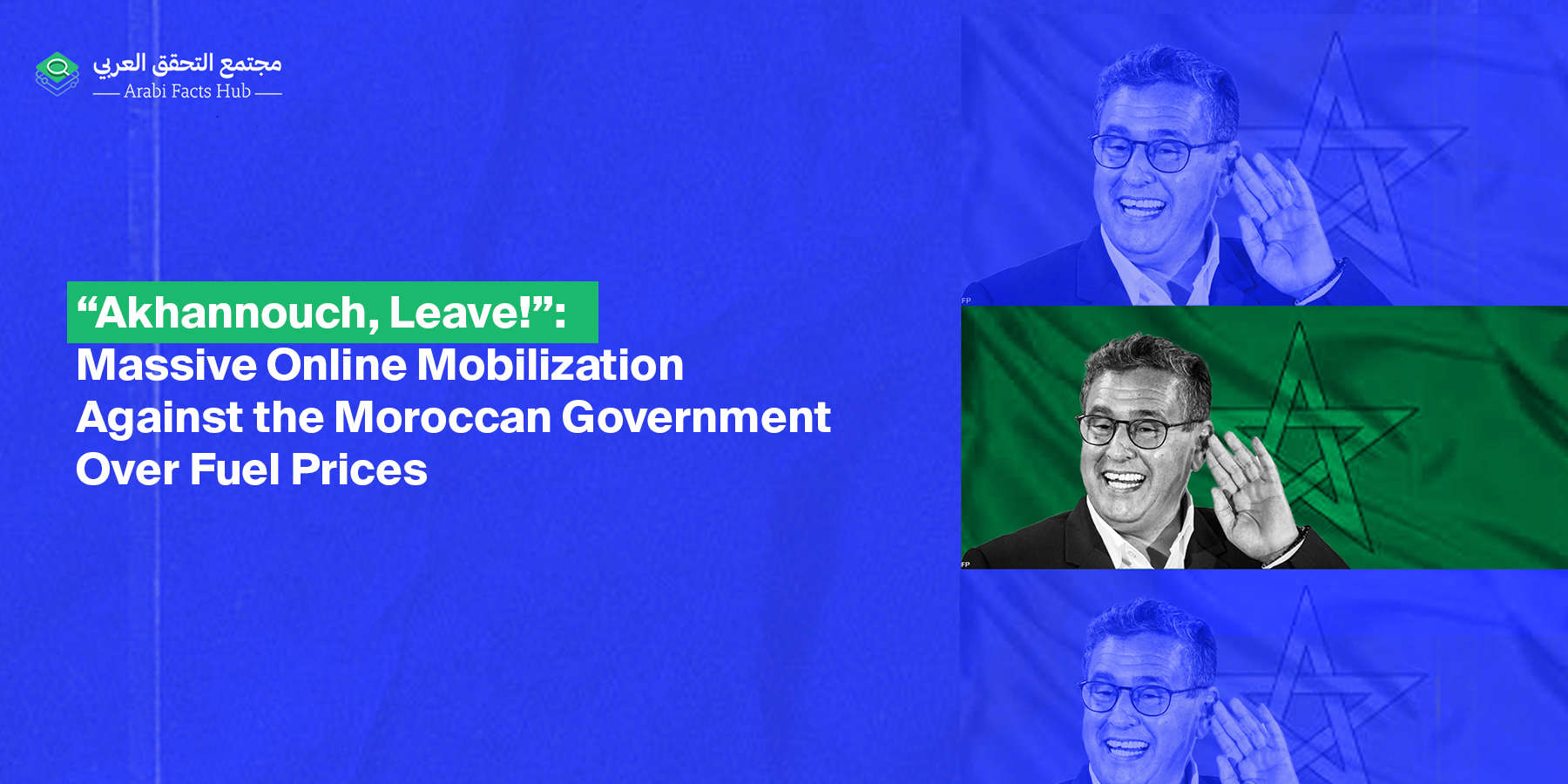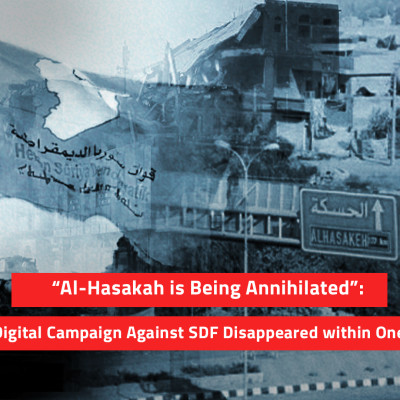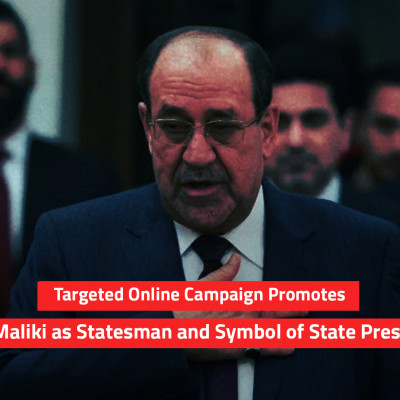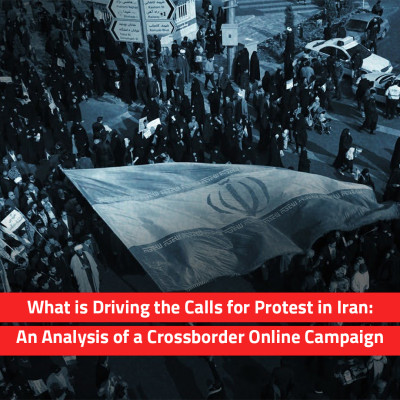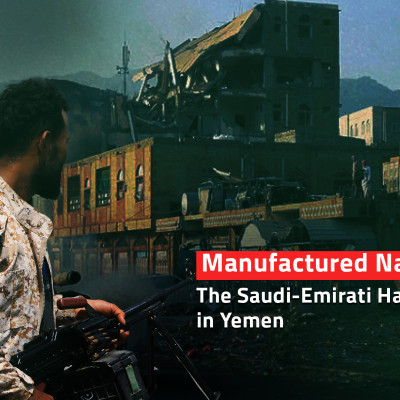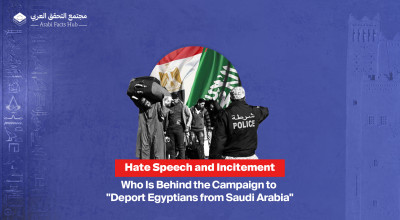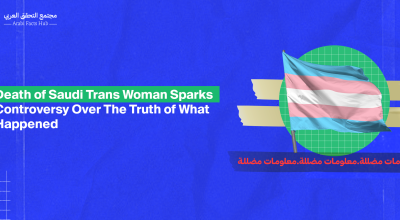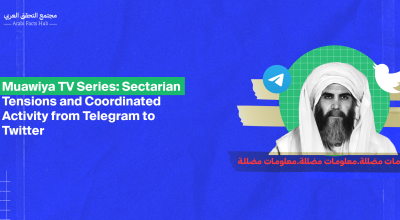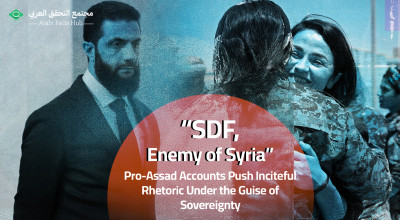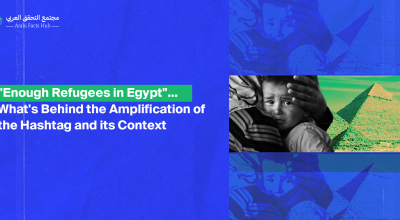What happened?
In mid-July, a set of hashtags emerged in Morocco, starting on Facebook. They carried demands for the resignation of Prime Minister Aziz Akhannouch and a reduction in fuel prices to their pre-Russian-Ukraine-war levels, citing recent declines in oil prices.
But who is Aziz Akhannouch?
In September 2021, Aziz Akhannouch assumed leadership of the Moroccan government, succeeding Saad Dine Elotmani, Secretary-General of the Islamist-oriented "Justice and Development Party."
In addition to leading the "National Rally of Independents" party, Akhannouch is a prominent businessman with an estimated wealth of two billion dollars. He is the chairman of "Akhannouch & Frères" and the owner of the "Aqua" company, which owns a number of companies that hold controlling stakes across various sectors, including fuel distribution, telecommunications, and services.
Years ago, Aziz Akhannouch's name became associated with the "17 Billion Dollar Case," where reports in the Moroccan press suggested that one of his companies had reached an agreement with fuel companies not to reduce prices in 2015 and 2016, resulting in allegedly illegitimate profits of 17 billion dollars.
Among the many active hashtags on Facebook, four stood out prominently:
| Hashtag | Total Number of Posts |
| 40,000 | #Akhannouch_Leave |
| 703,000 | #7dh_Gazoil |
| 626,000 | #Dégage_Akhannouch |
|
1000 |
8#dh_Essence |
**Statistics According to Facebook Search
Most of these hashtags are grouped together in a published post. To avoid duplicating results, we compiled the four hashtags together to analyze their interactions and determine their true total count. The results are as follows, according to Facebook Crowd Tangle tool:

Chart from CrowdTangle illustrating the total statistics of the activity of the top 4 hashtags in the campaign against the Moroccan government (#8dh_Essence, #7dh_Gazoil, #Dégage_Akhannouch, #Akhannouch_Leave)
Excluding the hashtag #Akhannouch_Leave, if we consider that the average total number of tweets in each of these hashtags exceeds 600,000, this implies that the portion monitored through the CrowdTangle tool represents approximately only one-third of the total posts. The tool found that there were 278,900 posts published across the four hashtags collectively, garnering over 52,000 emotion interactions until August 12th.
In the field of social media marketing, posts featuring images, videos, and live broadcasts typically attract a significant portion of user engagement. The number of posts of this type in the campaign hashtags exceeded 158,992 out of the total monitored posts through the CrowdTangle tool. This led to over 43 million interactions.
The limitations of the tool stem from the fact that its advanced search capabilities only track posts published on open pages, groups, and verified accounts on Facebook. Meaning, it does not track posts on the accounts of regular individuals and closed groups. At the same time, regular individuals contributed to two-thirds of the posts, taking into account their overall average count of 600,000 posts.
Facebook Groups: A Closer Look at the Mobilization Machine
The initial appearance of these hashtags was very weak between late 2021 and February/May 2022. However, organized momentum only began to manifest in the early stages of mid-July. Facebook groups played a significant role in popularizing these hashtags, with the total number of posts within open groups surpassing approximately 240,000 entries.
In the screenshot below, a post from one of the administrators of the group DACIA CLUB OF MOROCCO, urges members to participate in the conversation stating: "the hashtag is on the way, get involved."
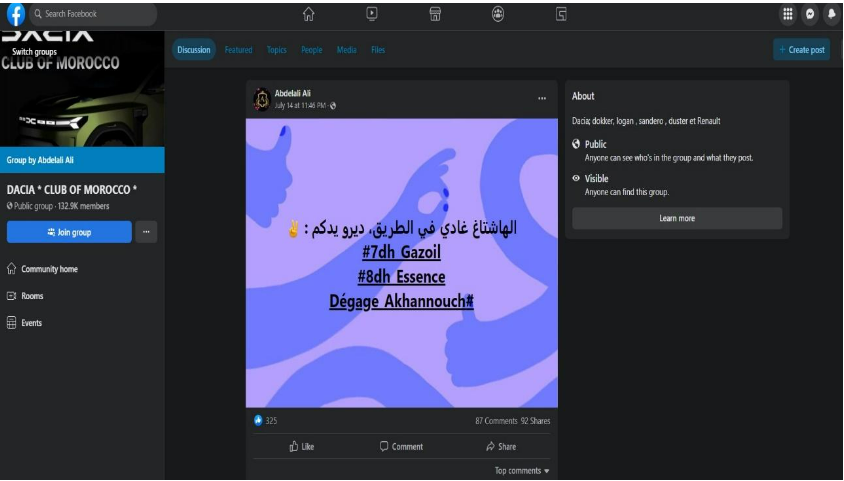
A wide spectrum of groups participated in mobilizing for the hashtag campaign, including those primarily interested in cooking and food, family issues, teacher communities, football fan groups, as well as car buying and selling groups.
One of the prominent groups in this regard was the group "Against the High Prices of Fuel and Food in Morocco", which gathered over 146,000 members since its creation in May last year. The group posts an average of 1,232 contributions a day.
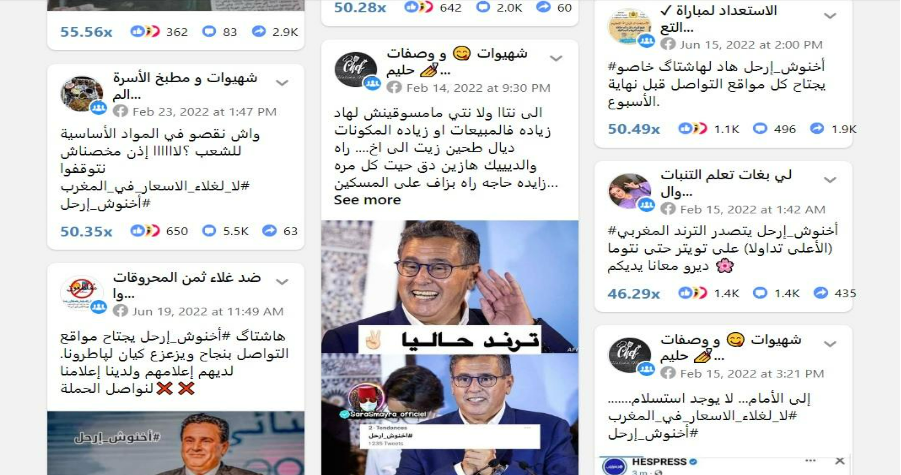
A screenshot from the Crowd Tangle tool showing a portion of Facebook group posts
Twitter... "The Role of Bot Accounts in the Arena"
In a series of tweets posted on July 17, Mark Jones, Assistant Professor of Middle East Studies at Hamad Bin Khalifa University in Qatar, discussed the trending hashtag #Dégage_Akhannouch within the context of intensifying criticism and calls for the departure of the Moroccan Prime Minister.
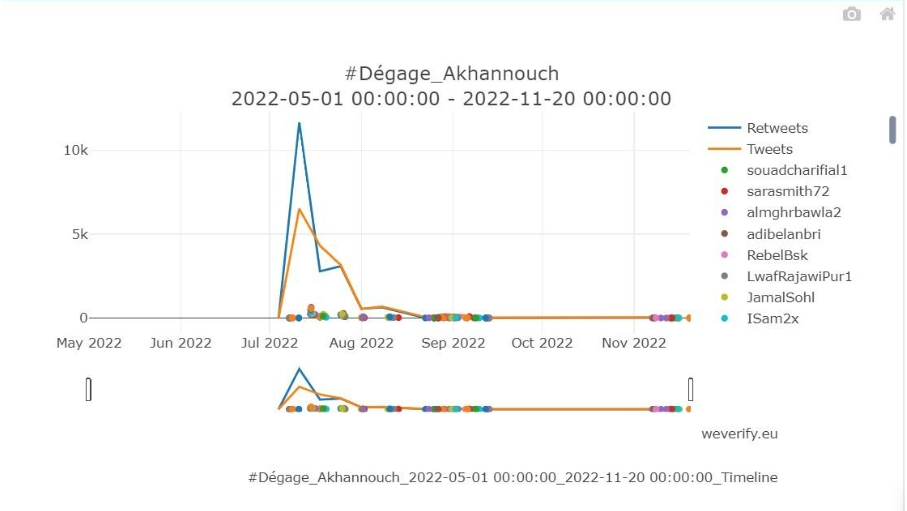
Screenshot displaying the peak period of the hashtag #Dégage_Akhannouch - InVID tool.
Jones stated that his analysis revealed the creation of 522 accounts in a single day (July 15), a significant date as the hashtag reached its peak from July 11 to July 17. Jones counted a total of 796 accounts that were established in July, and he cited 10,000 unique accounts which participated in the tweeting campaign at that time. There were swift reactions to the analysis in Morocco, where news outlets used it to claim that the campaign against Prime Minister Aziz Akhannouch was fabricated by fake accounts. On the other hand, several Moroccan journalists and campaign participants criticized Mark Jones, maintaining that they are Moroccans who are suffering from price hikes, and that the creation of new accounts does not necessarily mean they are fake since, they claimed, Twitter (X) is relatively less popular in Morocco.
Meanwhile, a wave of ridicule ensued in response to the government's assertion about fake accounts. Pages and groups circulated the phrase "Bot Accounts in the Field," accompanied by a video of supporters from the IR Tangier sports club singing the renowned ultras anthem “Hadi bilad al hikra” meaning this is the land of injustice/the loss of rights.
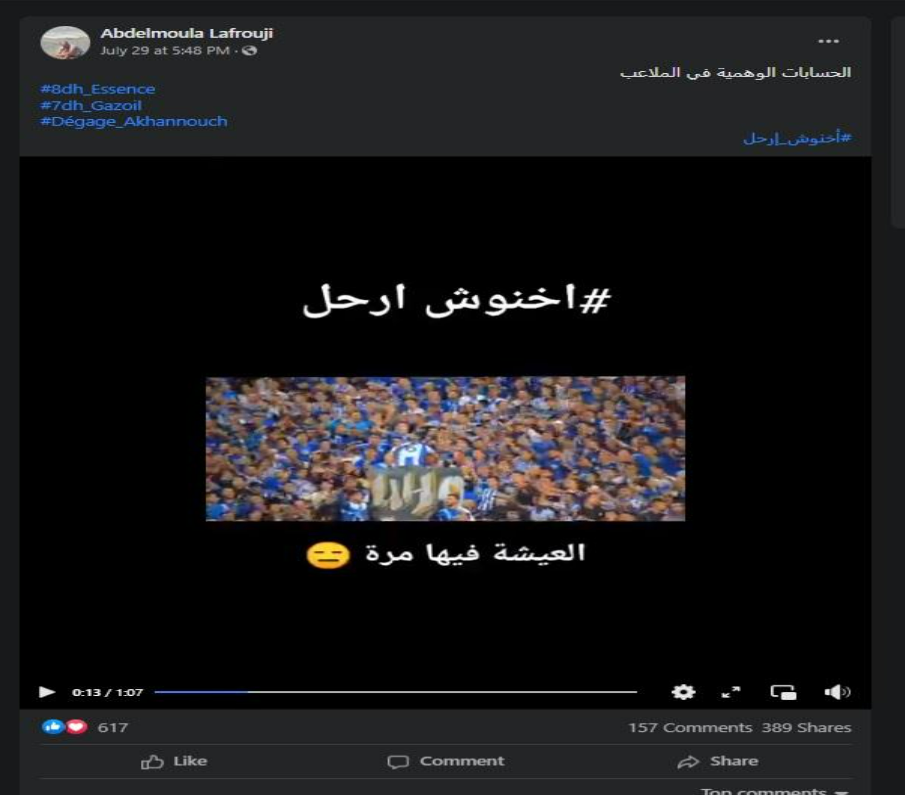
On July 24, fans shared recorded footage from the stands of Prince Moulay Abdellah Stadium in Rabat, chanting "Akhannouch, leave." A comment on the video read: "Fake accounts 🤣 yesterday from Moulay Abdallah Stadium in Rabat #Akhannouch_Leave."
As of early 2022, Twitter users in Morocco exceed 2.8 million, in contrast to Facebook, which has over 18 million users in the country.
Jones later clarified that he did not mean to suggest that the hashtag was launched by fake accounts. Perhaps the sole explanation for the simultaneous creation of new accounts is the migration of new users from Facebook to Twitter, especially since the accounts themselves do not exhibit strong indicators of being fake. For instance, numerous posts on the main group of the online campaign "Against the High Prices of Fuel in Morocco" include calls for group members to create accounts on Twitter and TikTok to contribute to the promotion of these hashtags. This almost coincided with the peak of the #Dégage_Akhannouch hashtag and the rest of the trending hashtags.
In the post below, someone mentions receiving advice from a friend on how to promote the hashtag, including creating accounts on Twitter and posting the hashtags in tweets with random text to avoid filtering or tracking by Twitter.
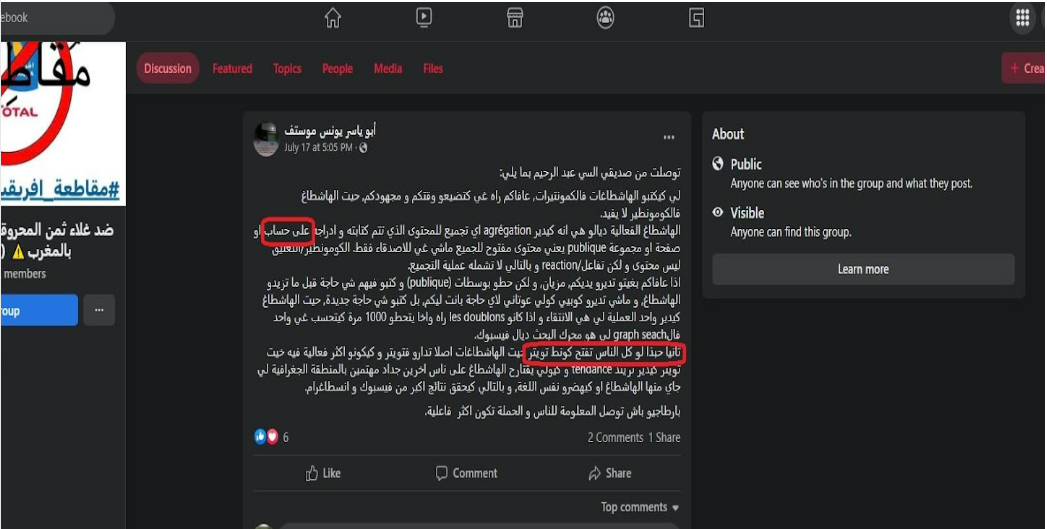
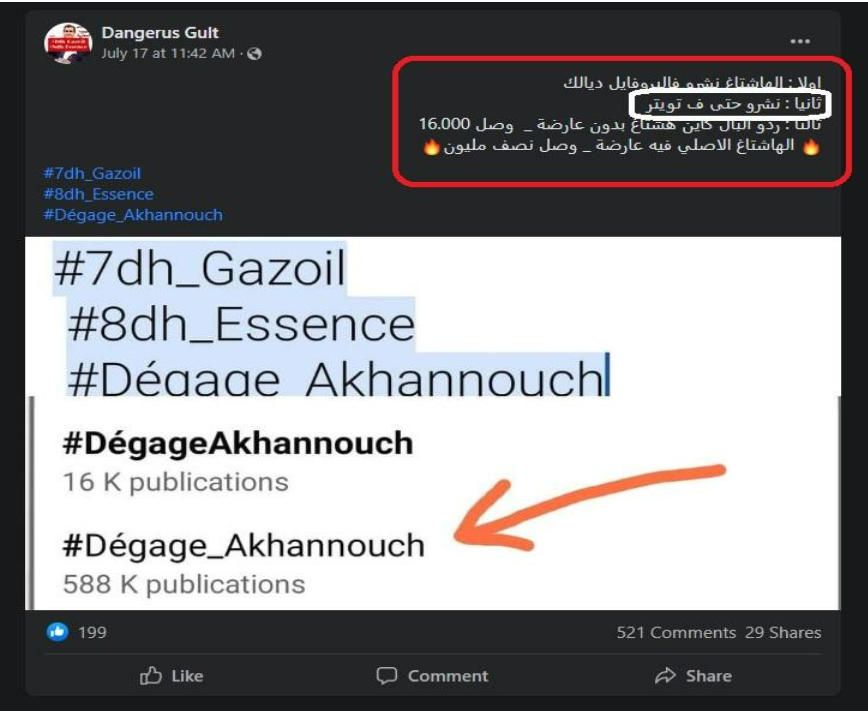
There was also some repetitive content on Twitter, but it was largely limited. Similar patterns were observed on Facebook. Although such repetition is often considered a sign of inauthentic activity, and while it appeared organized and coordinated, our observations suggest that it was primarily about disseminating posts to encourage participation. This was linked to the widespread online sentiment against rising prices and the economic situation in Morocco, rather than being part of a suspicious influence campaign.
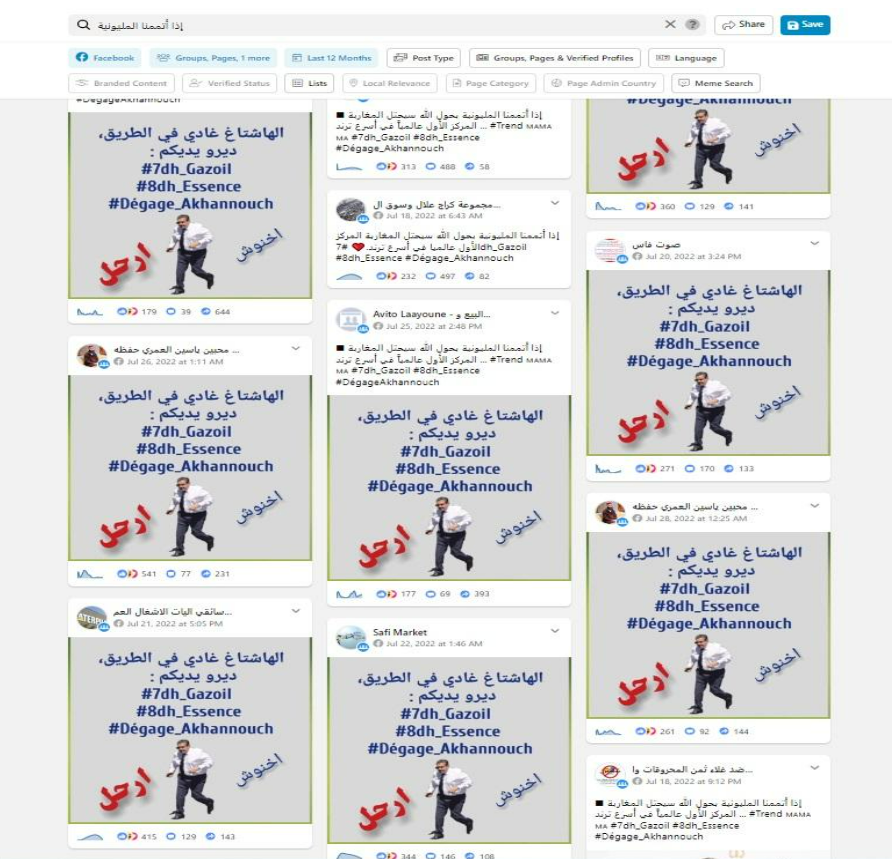
Screenshot from Crowd Tangle showing repetitive content by pages and groups on Facebook. In a similar screenshot below from Twitter, the use of the same phrase is evident in tweets synchronized in timing between the two platforms.
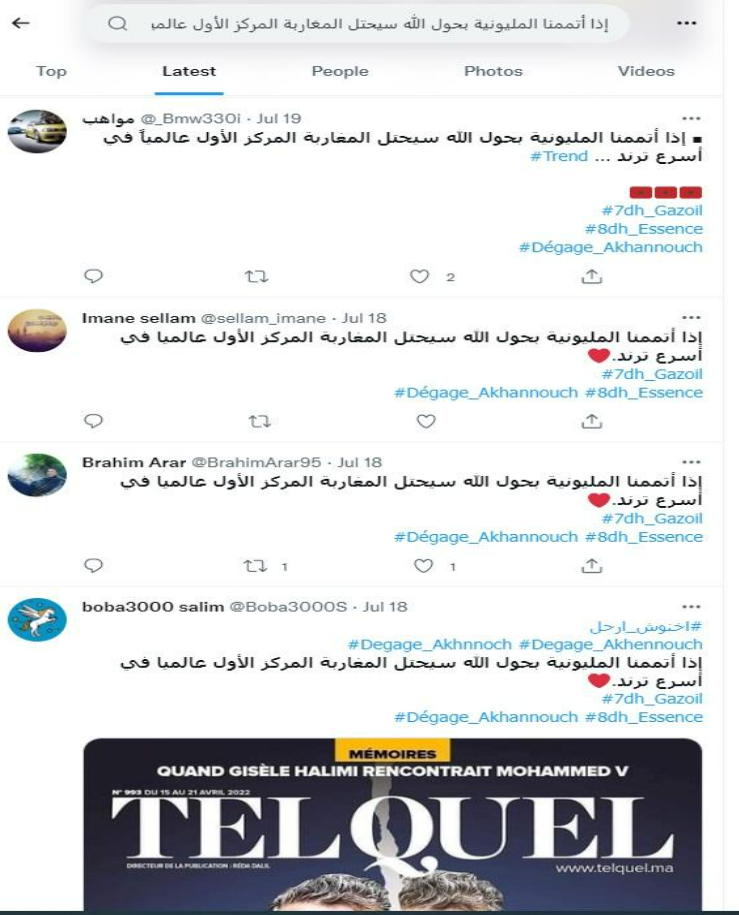
TikTok
The Chinese video-sharing platform TikTok has gained notable popularity among Moroccan social media users. The app had 5.97 million users in Morocco until early 2022. With video content comprising most of the posts of this campaign, participants found it easy to transition to this new virtual space. Hashtags opposing the government and protesting fuel price hikes garnered tens of millions of views. For instance, the hashtags #Akhannouch_leave and #7dh_gazoil accumulated over 135 million views. The posted videos included personal commentary on the price crisis and satire from amateur creators criticizing the government's performance.
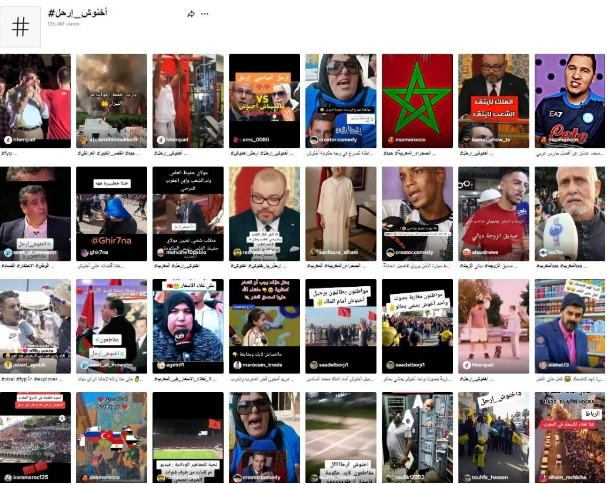
In summary:
The campaign demanding the resignation of the Prime Minister of Morocco and a reduction in fuel prices was semi-organized, drawing momentum from citizens' reactions to the government's performance and living conditions.
- The campaign was strategically organized to promote these hashtags.
- It originated from groups on Facebook, where a significant portion of the posts were identified using the Crowd Tangle tool. It later spread to other social media networks such as Twitter and TikTok.
- Posts from ordinary individuals represented the majority of the contributions.
- Videos, visual clips, infographics, and satire played a significant role in promoting the campaign.
